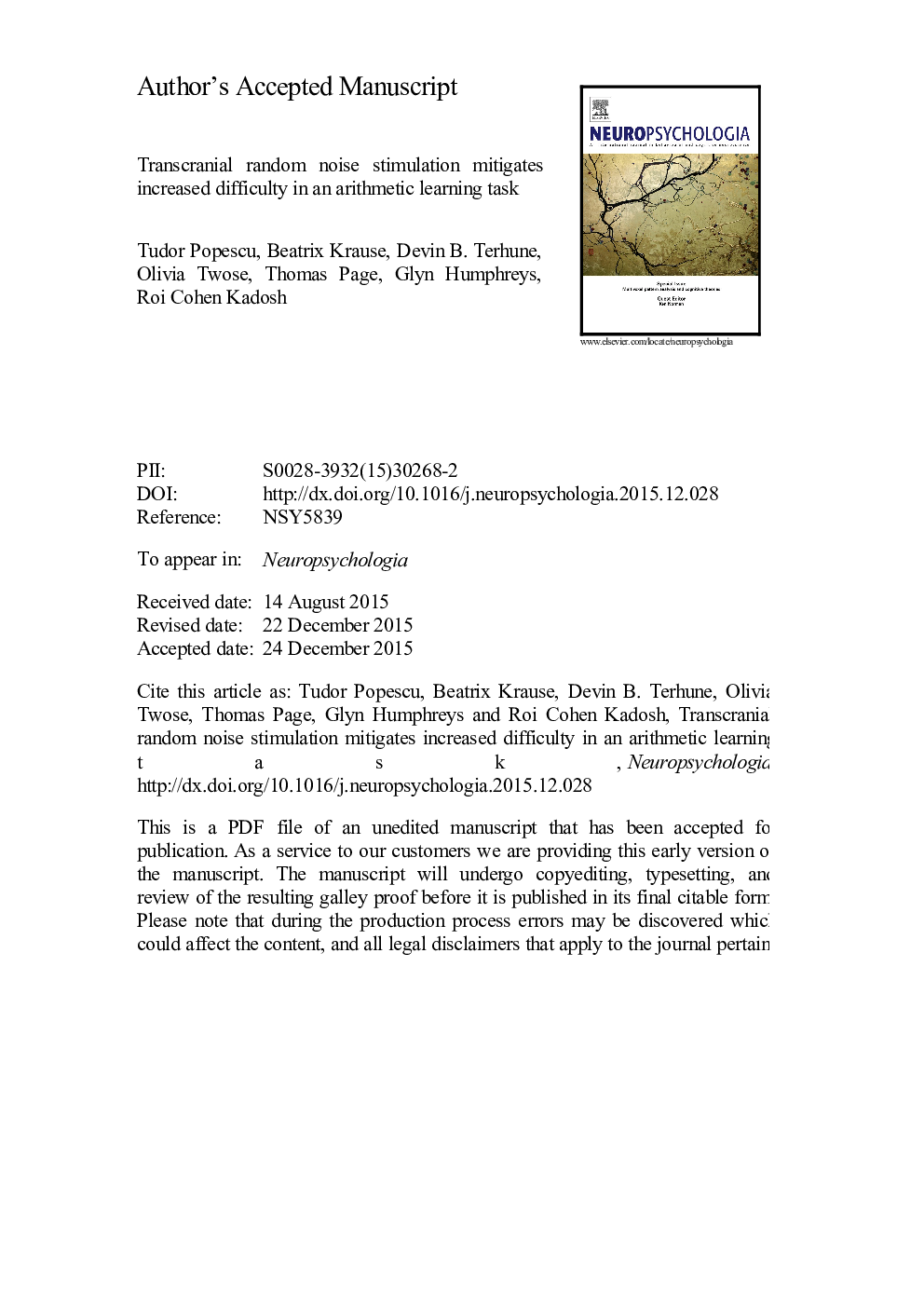| کد مقاله | کد نشریه | سال انتشار | مقاله انگلیسی | نسخه تمام متن |
|---|---|---|---|---|
| 7319534 | 1475573 | 2016 | 34 صفحه PDF | دانلود رایگان |
عنوان انگلیسی مقاله ISI
Transcranial random noise stimulation mitigates increased difficulty in an arithmetic learning task
ترجمه فارسی عنوان
تحریک سریع تصادفی سریعا کاهش مشکالت را افزایش می دهد در یک کار یادگیری ریاضی
دانلود مقاله + سفارش ترجمه
دانلود مقاله ISI انگلیسی
رایگان برای ایرانیان
کلمات کلیدی
موضوعات مرتبط
علوم زیستی و بیوفناوری
علم عصب شناسی
علوم اعصاب رفتاری
چکیده انگلیسی
Proficiency in arithmetic learning can be achieved by using a multitude of strategies, the most salient of which are procedural learning (applying a certain set of computations) and rote learning (direct retrieval from long-term memory). Here we investigated the effect of transcranial random noise stimulation (tRNS), a non-invasive brain stimulation method previously shown to enhance cognitive training, on both types of learning in a 5-day sham-controlled training study, under two conditions of task difficulty, defined in terms of item repetition. On the basis of previous research implicating the prefrontal and posterior parietal cortex in early and late stages of arithmetic learning, respectively, sham-controlled tRNS was applied to bilateral prefrontal cortex for the first 3 days and to the posterior parietal cortex for the last 2 days of a 5-day training phase. The training involved learning to solve arithmetic problems by applying a calculation algorithm; both trained and untrained problems were used in a brief testing phase at the end of the training phase. Task difficulty was manipulated between subjects by using either a large (“easy” condition) or a small (“difficult” condition) number of repetition of problems during training. Measures of attention and working memory were acquired before and after the training phase. As compared to sham, participants in the tRNS condition displayed faster reaction times and increased learning rate during the training phase; as well as faster reaction times for both trained and untrained (new) problems, which indicated a transfer effect after the end of training. All stimulation effects reached significance only in the “difficult” condition when number of repetition was lower. There were no transfer effects of tRNS on attention or working memory. The results support the view that tRNS can produce specific facilitative effects on numerical cognition - specifically, on arithmetic learning. They also highlight the importance of task difficulty in the neuromodulation of learning, which in the current study due to the manipulation of item repetition might have being mediated by the memory system.
ناشر
Database: Elsevier - ScienceDirect (ساینس دایرکت)
Journal: Neuropsychologia - Volume 81, 29 January 2016, Pages 255-264
Journal: Neuropsychologia - Volume 81, 29 January 2016, Pages 255-264
نویسندگان
Tudor Popescu, Beatrix Krause, Devin B. Terhune, Olivia Twose, Thomas Page, Glyn Humphreys, Roi Cohen Kadosh,
